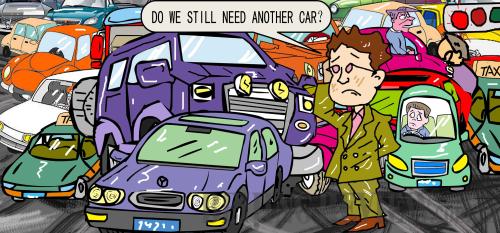|
 |
|
(LI SHIGONG) |
Traffic conditions in Beijing are deteriorating badly as time goes by, and severe traffic congestion occurs not only in rush hours but at any time of the day. The Foreign Policy magazine in the United States put Beijing No. 1 on its list of "cities with the most severe traffic jams."
The Beijing Municipal Government has taken a series of measures to cope with congestion in the city, and the latest policy includes strict restrictions on the number of newly purchased cars in the city. A quota for car purchases will be allocated freely by a drawing lot system.
The quota for new cars on the road in Beijing in 2011 is 240,000, or 20,000 each month. The average citizen receives 88 percent of the quota, profit-making vehicles have 2 percent and organizations 10 percent. People who are qualified can register on the Internet and are issued an application number. On the 26th day of every month, 20,000 numbers will be chosen by drawing lots. People who receive a ballot have to buy their cars within six months; otherwise their number expires. People who are not chosen will automatically go into the next month's draw.
This policy, from the time it was released, has received much public attention and been the topic of heated discussion.
Supporters say it's time the government took action to control cars in Beijing because of the severe traffic congestion. It would be another powerful method the Beijing Municipal Government could use to lessen traffic congestion following the widening and extension of transportation arteries, improvement of public transport and restrictions on car use based on the number of license plates.
Opponents say the policy is neither fair nor scientific for the average person. Also, car purchase limitations would hinder the development of China's automobile industry.
Urgent
Xu Kangming (The Beijing News): For a city like Beijing, if the number of cars is not limited, there will be a catastrophic outcome in the near future.
The restriction of buying and use of cars is inevitable and just a matter of time for Beijing. The earlier the government takes action, the smaller the price to be paid.
Following the Olympic Games in 2008, the growth rate of vehicles on the streets in Beijing went totally out of control. If the government still doesn't do anything, it will be a huge disaster for the environment, for road resources, and the travel demands of normal people and the improvement of living standards.
Traffic congestion affects normal function of the entire traffic system. Limiting the number of vehicles guarantees the interests of most people, though it may sacrifice the interests of those who want to buy cars. The policy will benefit people who drive, take a bus or walk.
In the first phase of the policy, no instant and huge improvement will be seen. But it will at least stop it from getting worse. The keys to lessening traffic congestion in Beijing are first controlling the situation and then improving it by developing the availability and convenience of public transport.
Nuan Yangyang 7 (club.auto.163.com): I think this policy is very good and I am totally for it. As vehicles are more affordable nowadays, more people are buying private cars in Beijing. Following the car use restriction based on license plates in the city, many families bought a second car, which put a greater number of cars on the road.
If things keep on going like this, there will definitely be greater numbers of cars in Beijing.
Estimation by the Beijing Transportation Research Center shows, even if all planned road networks are completed, the largest capacity would be 6.7 million vehicles. But current developments in vehicle buying will give the city more than 7 million vehicles by 2015. By then, the average speed of vehicles in Beijing will be below 15 km an hour and almost all arteries will suffer from traffic congestion or even paralysis. The government has to take stronger action.
Traffic congestion can't be solved immediately. This measure is designed to realize the rational development of the number of vehicles so as to effectively lessen traffic congestion. Time may prove the validity of the policy.
Chen Deming (finance.sina.com.cn): Every kind of human consumption has certain advantages and disadvantages. Over a certain time and given the knowledge of human beings, people will choose consumption patterns whose advantages outweigh the disadvantages.
This is the case for China's automobile industry. In order to stimulate domestic consumption in the ongoing financial crisis, the Chinese Government issued stimulus policies, which enabled vehicles with a small engine capacity to become the target of a buying spree last year. In 2010, total sales of vehicles reached as high as 18 million, much higher than in the United States and Japan. This kind of consumption apparently shouldn't continue and needs limitation since the infrastructure of cities is falling far behind vehicle sales.
In big cities, although there is big demand, we should limit the number of vehicles to a certain extent to make sure the general traffic situation is satisfying.
Unfair
Xie Weilie (auto.msn.com.cn): This policy is quite unfair. First of all, the policy of drawing lots with its elements of chance is not fair. Controlling the increase of vehicles should increase the cost for vehicle use rather than limiting purchases. For many young people who have just graduated with just enough money to buy cars, they have probably been travelling in an environment-friendly way in past years such as taking buses or the subway, and riding bicycles. When the time finally comes for them to buy cars, they are paying the cost for those who have enjoyed city resources ahead of them. This kind of policy is unfair and unjust for them.
| 